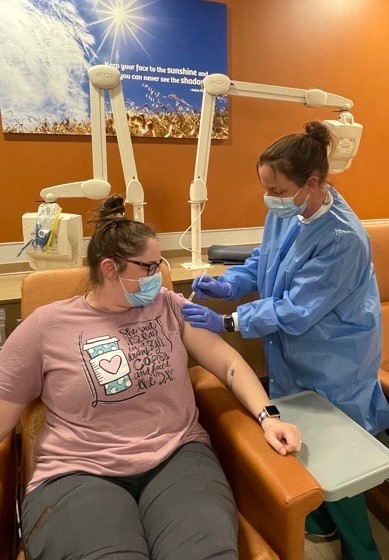
There is a crisis of COVID-19 vaccine equity. While we’re hearing about record-breaking vaccination numbers in some areas, underserved communities still trail far behind – making it crucial to close the gap.
Improving vaccine access requires tapping every resource to ensure no community is left behind.
This exact strategy recently unfolded to help protect one of the most vulnerable, diverse patient populations in the U.S.: people with kidney failure who rely on dialysis to replace the function of their kidneys.
In late March, COVID vaccines were allocated directly to dialysis providers to give to patients living with kidney failure, including ours. A campaign like this couldn’t have come fast enough for these 554,000 Americans.[i] This effort was made possible by government partnerships, including with the Biden Administration and the United States Centers for Disease Control and Prevention, which recognized the need to reach dialysis patients.
Dialysis patients often have underlying conditions, such as diabetes and high blood pressure, which weaken their immune systems and put them at greater risk if exposed to COVID out in the community. Many of them live in rural areas, have limited mobility and lack reliable transportation – all of which make it difficult to easily access vaccines.
On top of this, kidney failure disproportionately impacts communities of color, which have felt the heaviest burden of COVID-19 but are behind in vaccination rates. Black or African Americans are almost 4 times more likely to have kidney failure than White Americans, and Hispanics or Latinos are 1.3 times more likely.[ii]
Vaccinating patients during dialysis is a logical approach to removing these barriers. With dialysis clinics directly providing care in underserved communities of color, we are uniquely positioned to advance vaccine equity.
Dialysis isn’t optional; it’s life-sustaining. So during this pandemic, hundreds of thousands of dialysis patients have continued to travel to treatments three days each week. That’s why offering the COVID vaccine directly in dialysis centers made it easy for these patients to get vaccinated. In fact, dialysis providers routinely vaccinate patients this way against the flu, pneumonia and hepatitis.
The dialysis community vaccinated hundreds of thousands of patients across the country over the past several months. At DaVita, we are already seeing the positive impact on vaccine equity due to a direct allocation to dialysis providers. Nationally since the allocation, our Hispanic patients have been vaccinated at nearly the same rate as White patients, and the gap for our Black patients has been reduced to 10%. This marks incredible progress since the first few weeks of the vaccine rollout, when rates for Black and Hispanic patients were about 40% below White and Asian Americans.
Dialysis patients were able to get the COVID vaccine during treatment from the care team they know, trust and see weekly. This close relationship is how we at DaVita have been able to help overcome vaccine hesitancy. Through the trust we’ve built with each patient, we addressed concerns and empowered patients with the facts about COVID vaccines. As patients saw their peers getting vaccinated, they became more comfortable with the process. This environment enabled more than 70% of our patients nationwide to receive at least one vaccine dose by the end of April.
Through this pandemic, dialysis providers have cared for some of the hardest-hit and highest-risk communities in their greatest moments of need. Long after we emerge on the other side of COVID-19, we’ll still be here, working to effectively and equitably care for the vulnerable Americans who need us most.
This is why it’s so important for community-based health care providers, nonprofits and groups to help address vaccine equity for our neighbors.











